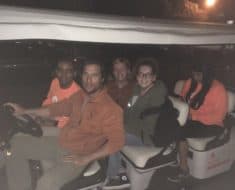
Source: https://www.yorkpress.co.uk/
If you’re heading to university in the UK, it’s important that you get to grips with the local dialect of your chosen university, as this will make your student experience much easier. Take a look at some of these top university cities and their popular phrases which you should consider learning before the semester starts.
London
The capital is a massive city with over forty higher-education institutions, catering to over 400,000 students in a variety of different subjects. The top universities include University College London, Imperial College London, and King’s College London which are located in different parts of the capital. When attending university, you will hear a wide range of accents which may be confusing; however, there are some slang words that are used by most Londoners.
“The tube” is one of the most important words you need to learn when moving to London for university, as this is short for the London Underground – which will be your main form of transport.
“Allow it” is a phrase that means contrasting. It may seem like you’re getting permission to do something; however, it actually means the opposite – stop it. While it’s unlikely your lecturer will shout allow it when you’re gossiping instead of listening, you may hear it when walking around London’s ends (neighbourhoods).
Bristol
One of the most popular student cities in the UK is Bristol, which is home to the University of Bristol and the University of the West of England. Although it’s not far from London, the residents speak complete different with their Bristolian farmer-style dialect.
“Brizzle” is what some of the locals call their home town, although there are some variations including Briz Vegas or just plain old Briz. Even if you don’t like the sound of the words, more than likely you’ll be using before the year ends.
The word “drive” does not require you to have a car when attending a university in Bristol. Instead, it is used on public transport, especially on buses where locals will greet the bus driver by merely saying “How much drive?” or “Cheers Drive”. This is something you will definitely get accustomed to when travelling around the city.
Liverpool

Source: https://static.independent.co.uk/
The northern city of Liverpool is home to three well-known institutions including the University of Liverpool, John Moores University and Liverpool Hope University. The first two are both located in the city centre, where students reside in students hall or private accommodation, such as the RW Invest luxury apartments which are popular with both freshers and postgraduate students. Whether you decide to live in the centre or on the outskirts, you should get accustomed to the Scouse slang you will hear every day.
“Scran” basically means food and is a good word to start with. All you need to do is ask “where shall we get scran?” or even “where can I eat a boss scran?”, and you will be eating in the best restaurants in Liverpool.
“Wool” is a word you may hear on your first few weeks of university. Wool could reference you or someone else who isn’t scouse. Don’t be offended as this is just an endearment used to describe people who aren’t from Liverpool.
Manchester
Just a half-hour away from Liverpool is one of the UK’s biggest cities – Manchester, which has four major universities. This includes the University of Manchester, Manchester Metropolitan, University of Salford and the University of Bolton which are all spread out across the city. While there are some sayings that Liverpool and Manchester share, the latter has its own unique way of speaking.
“Our kid” is an alternative greeting similar to “mate”, so if you hear someone saying “you alright our kid”, it doesn’t mean they’re referring to a baby but simply just saying hello. People in Liverpool also say this but tend to refer to their siblings of any age.
“Mither” will be used by one of your Mancunian peers when they can’t be bothered to do their assignment, which is due in the next following day. It can also means if they don’t get it done, they will land themselves in a bit of mither (bother).









































